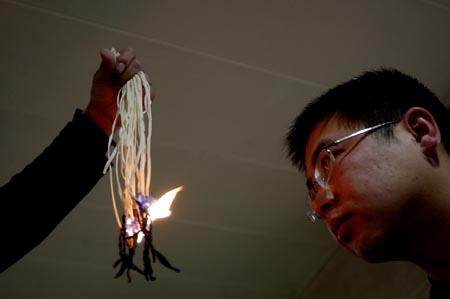Controversy over flammable noodles not warranted
Food experts said Thursday that noodles that ignite or burn when lighted with a match is perfectly normal and should not be a cause for concern to noodle lovers.
 |
|
A man stares at burning noodles in Xi'an, Shaanxi Province. Photo: CFP |
Some local authorities launched safety campaigns after several media reports said all types of noodles, a popular staple food across the country, are packed with chemical food additives that make them flammable.
Dahe.cn, news site in Zhengzhou, Henan Province, said Wednesday that some noodle makers add large amounts of chemical food additives in noodles, including food gum, potash (potassium carbonate) and phosphate compound, to make them more chewy and texture rich. As a result, some noodles can burn even when they are wet.
The report said that if the noodles smell like burning fur when it burns, it could be because of chemical additives. It also quoted a diner as saying that "consuming a bowl of ignitable noodle is equal to consuming a plastic bag."
News outlets in Nanjing, Yangzhou and Jinan tested the noodles bought in local supermarkets and set them on fire. They then reported on it.
Some experts said the only fiery noodles people should be cautious about are hot and spicy ones.
"The media is making a fuss over the safety concerns of the noodles," said Fan Zhihong, a professor at the College of Food Science and Nutritional Engineering at China Agricultural University.
"We used to measure the calories in some foods by burning them. We should be worried about food safety when some foods cannot be burned," said Fan.
After such reports, industry and commerce authorities in Zhengzhou initiated a citywide food safety inspection campaign to find noodle makers and sellers that offer unsafe noodles, China News Services said Thursday.
However, Fan and other food food security experts told the Global Times that combustibility is not a good way to judge whether noodles or any other food is safe to consume.
"Chemical food additives, such as food gum and phosphate compound, are safe and common food additives," Fan said. "For example, food gum is widely used in the making of jellies."
Fan said that it is possible that some noodle makers add alcohol in noodles to extend their expiration, but explained that alcohol evaporates when they're cooked and pose no danger to people.
"To judge whether the noodles have too many chemical additives, customers should examine the color of the noodle and see whether it has irritating smells," Fan said.
 0
0 






